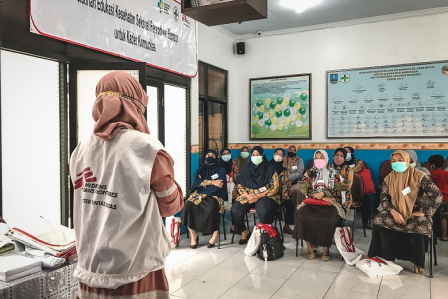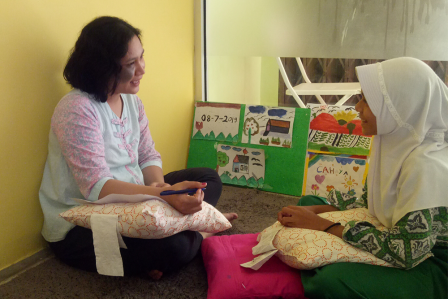Indonesia: Community health engagement in Indonesia
Posyandu Remaja (PosRem) in Tembong, Carita Sub District, is one of the youth integrated health posts pilots starting in 2020. This PosRem named PosRem Respati has also begun to replicate the Youth Corner designed by MSF in Indonesia at its building office since the end of 2020. Today, almost every day, 15-20s children to adolescents visit it after their school hours from Monday to Friday. Indonesia, 2021. © MSF
Doctors Without Borders / Médecins Sans Frontières (MSF) has supported the Indonesian Ministry of Health in improving access to healthcare for adolescents in Indonesia since 2017. This programme is amongst other projects (such as capacity building in emergency response for natural disasters and emergencies, and COVID-19 activities) run in two sub-districts of Banten Province, Labuan and Carita. In 2019, Doctors Without Borders opened a youth corner in Labuan – a place where adolescents could come after school and get involved in a range of activities such as drawing, craft and much more, whilst at the same time receiving information about good hygiene practices, healthy living and sexual and reproductive health from the health promotion team. The team also conducted activities in schools and community groups.
The village of Tembong is around 25 minutes' drive from the Doctors Without Borders project office in Labuan sub-district – one out of 19 villages assisted by Doctors Without Borders teams in Banten province, on the westernmost tip of Java Island, in Indonesia. Not far from the local village authority office in Tembong, Carita subdistrict, there is a pavilion, which has a handwashing tank out the front. Some kids are seen in the yard of the building. There is a sign which reads ‘Posyandu Remaja’ – which in English translates as ‘integrated health post for adolescents.
But, that afternoon when the Doctors Without Borders team visits the facility, it is not an integrated health post activity. Instead, the young people who run the post are preparing the youth corner’s activities for their younger village peers. It is a safe place for kids to gather, where they can do activities and receive health information.
In 2019, in cooperation with the local community and health centre, the Doctors Without Borders team opened a youth corner in the office building.
Unfortunately, in 2020 MSF had to close the youth corner because of the COVID-19 pandemic. But the team continued the health promotion activities online. We also supported community health personnel and village elders to renovate public facilities and run adolescent health centres. We’ve now integrated the youth corner programme into these facilities.Jonny, Project Coordinator
How did it start?
Following a discussion between the Carita sub-district health office, the Puskesmas (public health centre) of Carita, and Doctors Without Borders, it was agreed that an adolescent integrated health post should be formed at village level. The Doctors Without Borders and Puskesmas teams identified the best villages to pilot the programme, and Tembong and Teluk villages, in Carita and in Labuan respectively, were selected.
The process continued by involving more stakeholders such as village authorities, health offices, education offices, sub-district offices, state, and Islamic boarding school communities, the Rukun Tetangga (neighbourhood association), the Rukun Warga (citizens’ association), village governments, and the Posyandu staff, as well as the “cadres” – a small group of either adults or youth organised to instruct or lead others – who lead the programme.
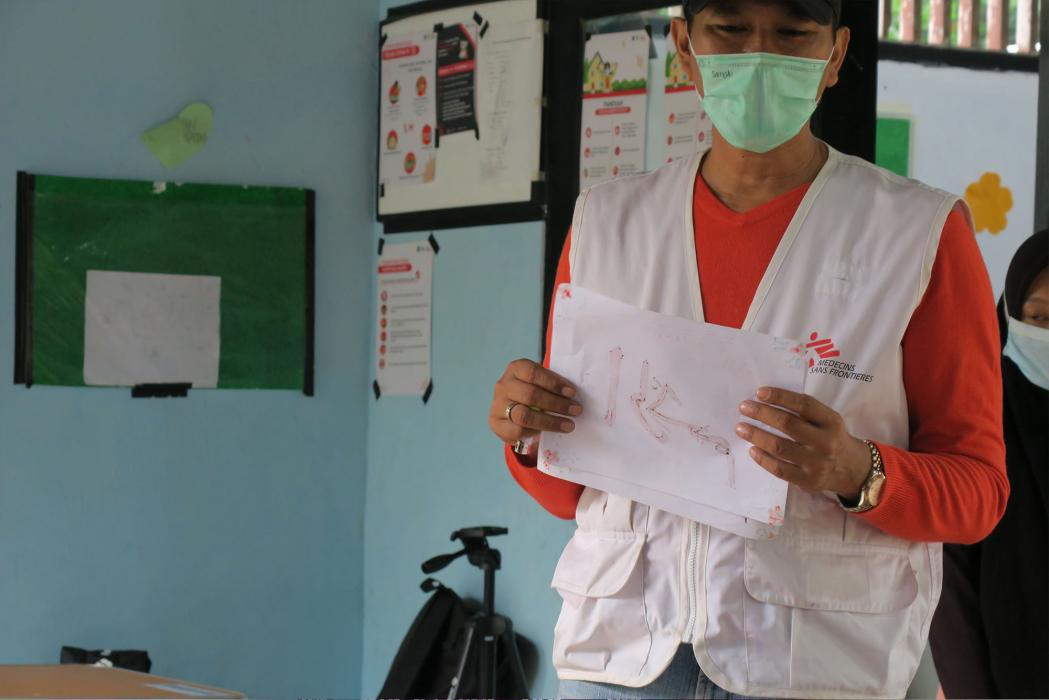
Ahmad Suryadi, a member of the Doctors Without Borders Community Health Promotion team, is collecting the calligraphy work of the youth centre's visitors. The Doctors Without Borders team assists and monitors the implementation of the youth corner and adolescent integrated health post in both Tembong and Teluk villages. Ahmad said that one of the reasons Doctors Without Borders chose those villages is because there is a strong willingness of the village head. Such as in Tembong village, which already has a children's forum and that runs a government-backed family planning programme. Indonesia, 2021. © Sania Elizabeth/MSF
In Tembong, the Doctors Without Borders team approached Adang Kosasih, the village head, to offer that the adolescent health post programme be piloted in the village. He was keen, since the village has a children’s forum and they wanted to add more activities for their young community members.
“We have collaborated with elementary schools and Islamic boarding schools,” says Kosasih. “Also, we encourage the schools' management to ensure that the students visit the health post that is held once a month, so they can benefit from basic health screening on a regular basis.”
The youth corners in the neighbourhood
For Tini Pebrianti, the head of Tembong’s service division, having the youth corner in her village is a good thing.
“The teenagers can spend their time doing positive things,” says Pebrianti. “They don't play on their mobile phones too much and don't need to travel far to access the facility. So, there are a lot of benefits.”
In the afternoons after school, the young members of the community can do activities in the youth corner, which is open every Monday to Friday. They can try art, drawing, calligraphy, and crafts. Importantly, they also learn about health.
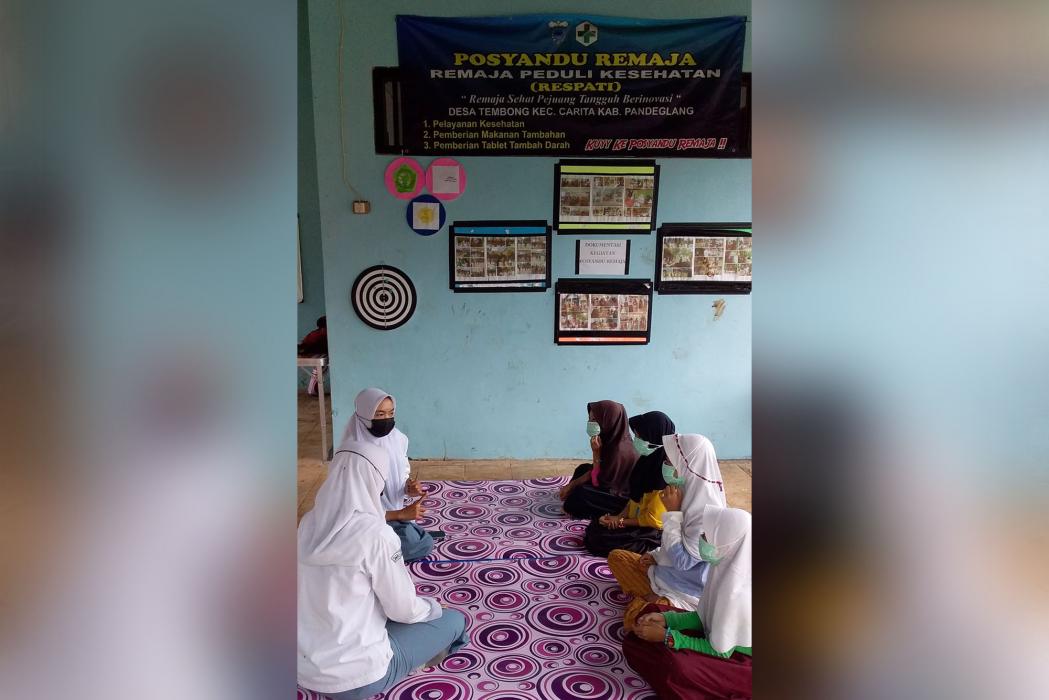
Doctors Without Borders in Indonesia has trained the young village cadres on health, organizing, public speaking, and more. The older adolescents in the picture are the health cadres of the adolescent integrated health post of Tembong Village, Carita Sub-district, Pandeglang District, in Banten, Indonesia. The younger adolescents who visit the post will get some health education sessions from the older adolescent who is trained cadres. They play and have fun in the post, but they also get some education to share their knowledge with their families at home. Indonesia, 2021. © MSF
Uul Mardiyah, one of the youth centre's cadres, said she has benefited from engaging with Doctors Without Borders and health cadres in these activities. Doctors Without BordersF staff trained the young cadres to conduct essential health screening, undertake health promotion activities, to speak in public, and to teach English.
“At first, I was not confident to speak in front of people,” says Mardiyah. “After I joined the training and activities at the health post and youth corner, I learned public speaking, and I know more about health.”
The youth corner activities in Tembong started in mid-September 2021 and were at that time visited by between 10 and 20 adolescents. By October 2021, the youth corner had received about 600 visits. Both Pebrianti and Mardiyah believe that the health post and youth corner will continue to run without Doctors Without Borders, as the village government supports its funding by including it in its annual village budget.
There are challenges, such as a high turnover of young cadres as they move on to study or work, but the programme continues. And the continual engagement and training of new young cadres is essential to ensure the youth corner's programme in their neighbourhoods. A high sense of ownership from the community is essential tohelp this programme continue.
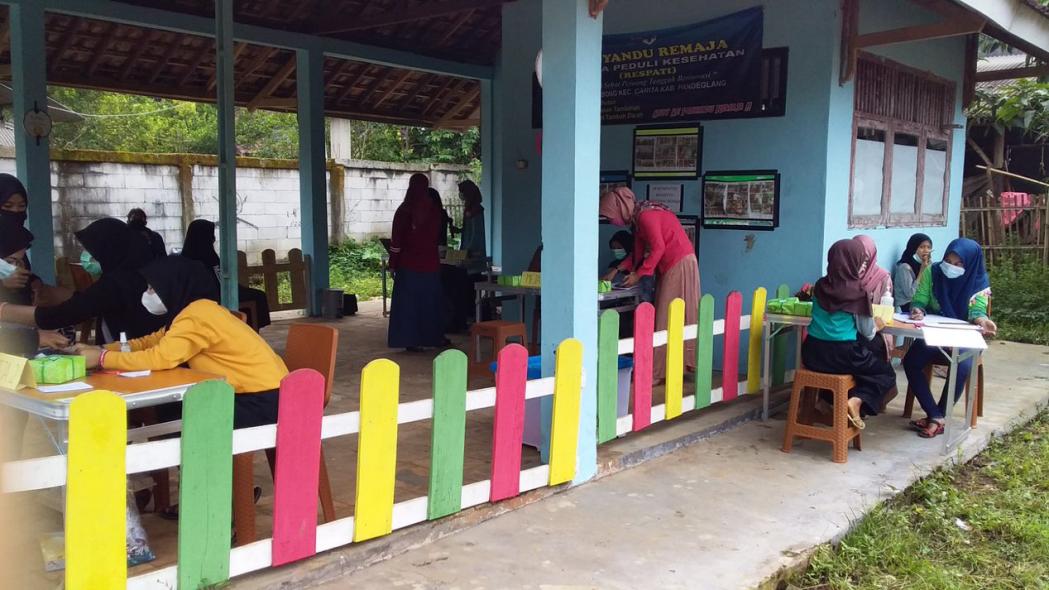
During the adolescent integrated health post-activity, the situation is conducted every once a month for the young people in Tembong Village, Carita Sub-district, Pendeglang District, Banten Province, Indonesia. Doctors Without Borders has trained the young health cadres, and they have been able to do the basic health screening for the visitors who are keen to check their health condition. Indonesia, 2021. © MSF
The way forward
The pandemic has hampered the programme, as people could not gather in public facilities. But, as the second wave of COVID-19 has waned, young people have started visiting the posts and enjoying the youth corners once again.
In 2022, Doctors Without Borders will hand over the youth corners in Labuan and Carita to the village authorities, as they are now working well. And the Doctors Without Borders support team will move on to a new site with all the lessons learned so far.
